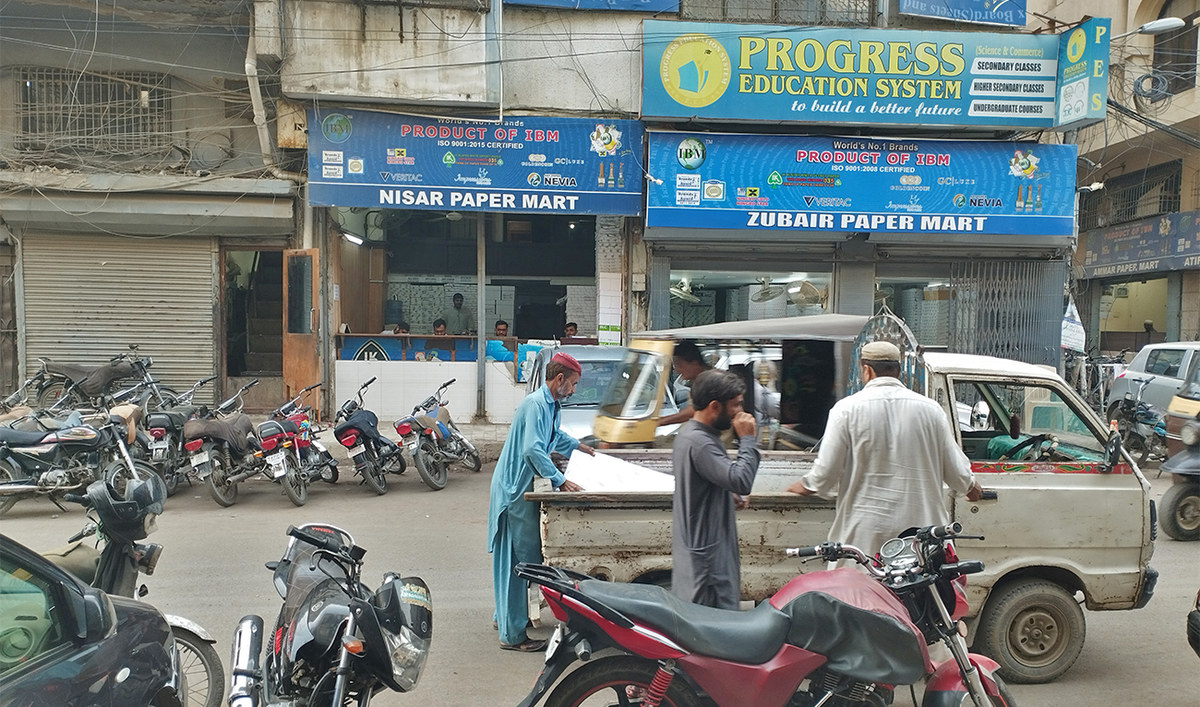KARACHI: In a dimly lit room buzzing with the sound of a paper pressing machine, young workers swiftly folded and packed wedding invitation cards.
Most were worried.
Their workshop is located on Pakistan Chowk in old town Karachi, an area once known for its sprawling printing press business but where most machines are offline today and workers in the thousands face an uncertain future amid a decline in the paper industry.
As the price of printing paper has soared by around 200 percent in the last eight months due to a hike in international freight charges and the volatility of the Pakistani currency, most workers at Pakistan Chowk interviewed by Arab News said they were afraid they would be out of work soon.
Press owners too said the business of printing invitations and visiting cards as well as books had halved on the back of the rising cost of paper and diminishing demand.
Pakistan meets 90 percent of its paper requirement locally but the raw material — pulp — is imported. Imported paper is also subject to various taxes.
“When the prices of imported offset printing paper increased due to the rising dollar-rupee disparity and freight charges, the local mills were also quick to jack up prices,” Muhammad Anis, senior vice chairman of the All Pakistan Paper Merchants’ Association, told Arab News.

The image shows printing workshops located on Pakistan Chowk in old town Karachi, Pakistan, on November 11, 2022. (AN Photo)
The rising cost of paper, he said, was hurting printing press owners, workers, publishers, sellers and citizens alike. High electricity tariffs and rising wages were also contributing to the decline of the printing business, with business owners now struggling to survive on thin profit margins.
“The paper market has almost been behaving like gold exchange,” Mehmood Hamid, general secretary of the Pakistan Small Printing Press Association, said. “Every day new rates are quoted … An atmosphere of uncertainty and fear prevails.”
“Our business activities have contracted by 40 percent,” he added. “Our liabilities are on the rise. It’s not only the laborers who are suffering. The owners are finding it difficult to keep pace with the rising costs [of paper] and diminishing business.”
Persistently high inflation has put severe strain on the South Asian country’s economy, which is also reeling from falling foreign exchange reserves, a depreciating and unstable currency, as well as a widening current account deficit.
“It is a very painful situation now, particularly for parents of young children,” Anis said.
“The average price of a complete set of school course books along with other learning material, which was Rs4,000 to Rs5,000 earlier, has gone up to Rs12,000 to Rs15,000. It is a 200 percent hike. Some textbooks are still not available in market, though the academic year has been in progress for a while.”
As textbook printing slows down, some disheartened sellers at Karachi’s famous Urdu Bazaar, located near Pakistan Chowk, said they were looking for alternative work opportunities and considering shutting down their businesses.
“The rates of paper used for textbook printing, which once stood at Rs1,300 per ream, is now somewhere around Rs3,500 to Rs4,000. At such exorbitantly high rates, business obviously seems unfeasible to publishers,” Usman Ghani Tahir, who is in the publishing business, told Arab News.
“Book printing business is now down to only 40 percent and some of the people are in the process of winding up their businesses.”
Abdullah Abdul Ghafoor, a father of six children who works as a bookbinder at a local printing press, said he had to put all his family members to work to make ends meet:
“I earn Rs700 ($3.2) daily and consume all my income the same day … All my children work to augment the family income. Yet, I am worried about the future since we are not getting enough work and the income of my children has also reduced. Sometimes we don’t even find enough to eat.”
While business owners said they sympathized with struggling workers, they did not have the means to bear the burden of their laborers’ growing financial needs.
“Our business has gone down to only 50 percent,” Muhmmad Osman Sharif, general secretary of All Pakistan Organization of Small Traders and Cottage Industry, said.
“The printing cost of a wedding card that used to be Rs20 is now Rs80. Many people used to ask us for 1,000 wedding cards, but now most of our customers only request for 100 or 200 cards.”

Wedding and other invitation cards are displayed in a shop on Pakistan Chowk in Karachi, Pakistan on November 11, 2022. (AN Photo)
“The printing business has shrunk,” Hamid from the Pakistan Small Printing Press Association added. “No one is obviously going to pay wages without adequate work. I think 20 to 25 percent laborers have already lost their livelihoods.”












